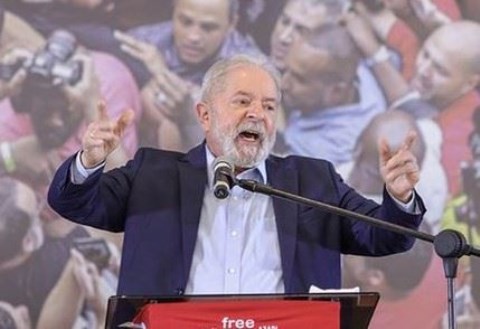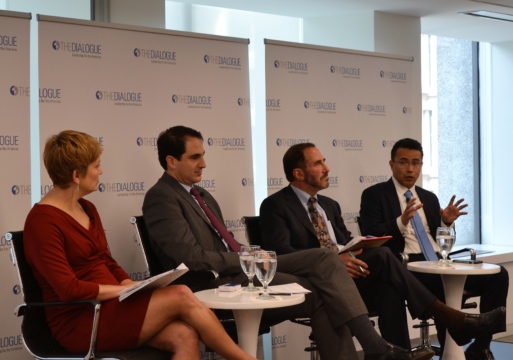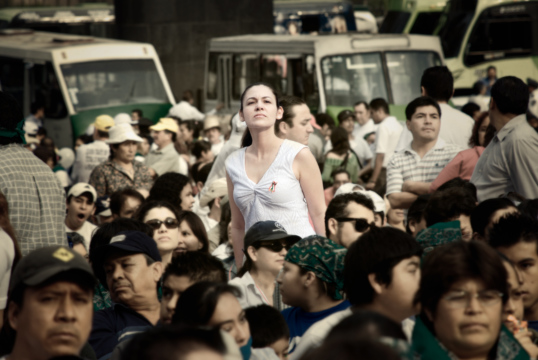
‘Campanha bizarra, cruel e divisiva’, avalia especialista americano
Presidente emérito do Inter-American Dialogue, Peter Hakim diz que maioria republicana sabe que Hillary é provável vencedora.
During the next 11 months, three major economies in Latin America – Brazil, Chile, and Colombia – will hold presidential elections. Meanwhile, Peru is facing a post-election crisis and Ecuador potential escalation of protests. Michael Shifter, president of the Inter-American Dialogue sits down with Latinvex to answer four important questions: Can a third candidate in Brazil win against the top candidates, former president Luiz Inácio Lula da Silva and current president Jair Bolsonaro? Will Colombia become more radicalized if the leftist frontrunner Gustavo Petro wins? How will Chile change after the elections? What is the political outlook in Peru and Ecuador?
Question (Q): What is the political outlook in Brazil? Can a third candidate win against Lula and Bolsonaro?
Answer (A): In highly polarized Brazil, where Bolsonaro’s support has dropped significantly, Lula has the best chance of winning the presidency in 2022. He enjoys a lead of some 20 points over Bolsonaro. While Bolsonaro’s reelection is highly unlikely, it is not impossible. The economy, which has not been performing well, is the major variable, together with the possibility that COVID will recede as an issue when the election takes place next October. Incumbency and significant public spending employed for clientelistic politics are advantages that could give Bolsonaro a bounce. So far, the more centrist options in Brazil, from Ciro Gomes to João Doria and Sergio Moro, have been unable to get any traction in such a polarized political environment. They barely register in the polls. To be sure, if Bolsonaro’s numbers crater and he loses his core support over the next ten months, it is conceivable that one of the more centrist options could emerge, surpass Bolsonaro, and end up competing with Lula in the second round. That scenario, though highly improbable, cannot be entirely ruled out.
(Q):What is the political outlook in Colombia? Will Gustavo Petro actually win or will an anti-Petro candidate win in a second round?
(A): The political outlook in Colombia is highly uncertain. To date, Gustavo Petro is leading in the polls and, barring some unforeseen, dramatic development, will make it to the second round vote next June. Petro’s strong support among a sizeable sector of the Colombian population is not surprising. Colombia, which has seen considerable social unrest in recent years, offers fertile ground for a candidate who rails against the establishment and takes advantage of discredited traditional political parties and widespread corruption. But Petro has many liabilities: he is a polarizing figure who has very high negatives among Colombians. As Bogota’s mayor, he faced allegations of mismanagement and illegal decrees that ultimately resulted in his removal from office. As a measure of how wide open the campaign (which has not yet legally commenced) is, there are roughly 50 precandidates for the presidency. It remains to be seen who will end up competing with Petro and whether that candidate will be able to unite the country’s wide spectrum of political forces. Although Petro could win and be Colombia’s first leftist president, there will be significant pressure to elect a more centrist, moderate option in the second round.
(Q): What will happen if Petro wins? Will he try to follow Hugo Chavez in terms of radical economic policies and nationalizations?
(A): Even if he wanted to, Petro would not be able to pursue the radical economic policies carried out in Venezuela over the past two decades. Colombia is not Venezuela, and the Petro/Chavez comparison is far-fetched. Unlike Venezuela in 1998, Colombia has not lost 40 percent of its national income over the previous 20 years. Despite facing many tough problems, the country is in far better shape than Venezuela was, and while there is a broad appetite for social and political reforms, there is little interest in a revolution that would seek to destroy Colombia’s institutions. It is hard to imagine that the unmitigated disaster and tragedy that Venezuela is today would open up the possibility for Petro to even attempt to follow the same course in Colombia.
(Q): What is the political outlook in Chile after the upcoming elections? Will Chile become more radicalized? Will Congress be more splintered?
(A): Chile is at a crossroads. Its political outlook has rarely been more uncertain. The country displays high levels of social discontent and political polarization. Rhetoric and policy ideas critical of traditional elites and are anti-establishment – whether coming from the right or left – are gaining traction.
[...]
Presidente emérito do Inter-American Dialogue, Peter Hakim diz que maioria republicana sabe que Hillary é provável vencedora.
Latin America faces many challenges in developing its energy resources and providing clean, affordable and reliable energy. With presidential elections in Brazil, Mexico and Colombia next year, there is considerable uncertainty about future energy policy, as potential candidates in these countries have presented widely varying energy and economic policy platforms.
Next year, critical elections in Latin America’s three most populous countries—Colombia, Mexico and Brazil—are likely to reveal a distemper stemming from citizen disgust with a mix of corruption scandals, mediocre economies, unremitting violence and a largely discredited political class. All three presidential contests are wide open and ripe for anti-establishment challengers.
 LatinVex / Twitter / LulaOficial
LatinVex / Twitter / LulaOficial

